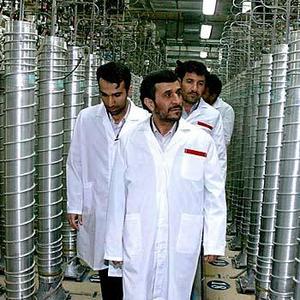Iran's march to the bombIran's nuclear fuel swap is a sham; sanctions may still be imposed
Following a meeting in Tehran over the weekend of the leaders of Iran, Brazil, and Turkey, Iran said it agreed to send 1,200 kg of low-enriched uranium (LEU) to Turkey in exchange for 120 uranium rods enriched to 20 percent; Turkey and Brazil were quick to argue that there is no reason now for sanctions on Iran; the deal, though, is a sham; Iran has more than a ton of LEU left, and most importantly: it continues aggressively to enrich uranium and it has accelerated work on other components of a nuclear weapon

Iranian President Mahmoud Ahmedinejad touring a uranium enrichment facility // Source: topnews.in
Iran’s agreement this week, following a visit to Tehran by the leaders of Brazil and Turkey, to swap low-enriched uranium for more highly enriched fuel elements may not prevent UN sanctions. Iran will send 1,200 kilograms of its low-enriched uranium (LEU) to Turkey, and in return will get 120 kilograms of the uranium fuel elements enriched to 20 percent that it needs to power a medical research reactor in Tehran. Iran agreed a similar swap in October 2009, but backed out.
Debora MacKenzie writes that Turkish leaders who helped broker the deal say it should deflect UN sanctions against Iran over its nuclear activities. The United States and the European Union say the deal does not substantially change the situation.
It was originally thought that a swap would remove most of Iran’s LEU, and so ensure it would not be further enriched to weapons-grade. According to the International Atomic Energy Agency, however, continued production by Iran’s enrichment plants means that it will still have 1,200 kilograms left after the swap.
The exchange was also meant to deprive Iran of a legitimate reason to make 20 percent enriched uranium, which is near weapons-grade. Iran says it will continue enrichment anyway.
